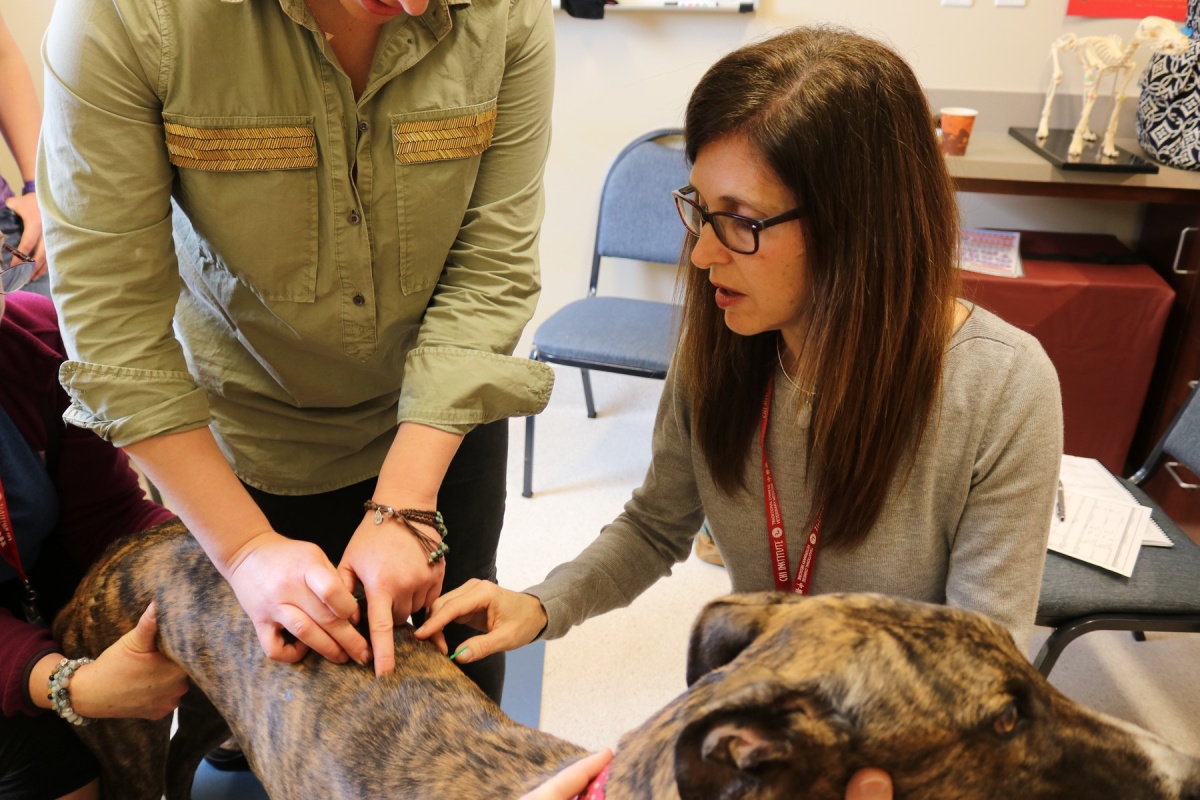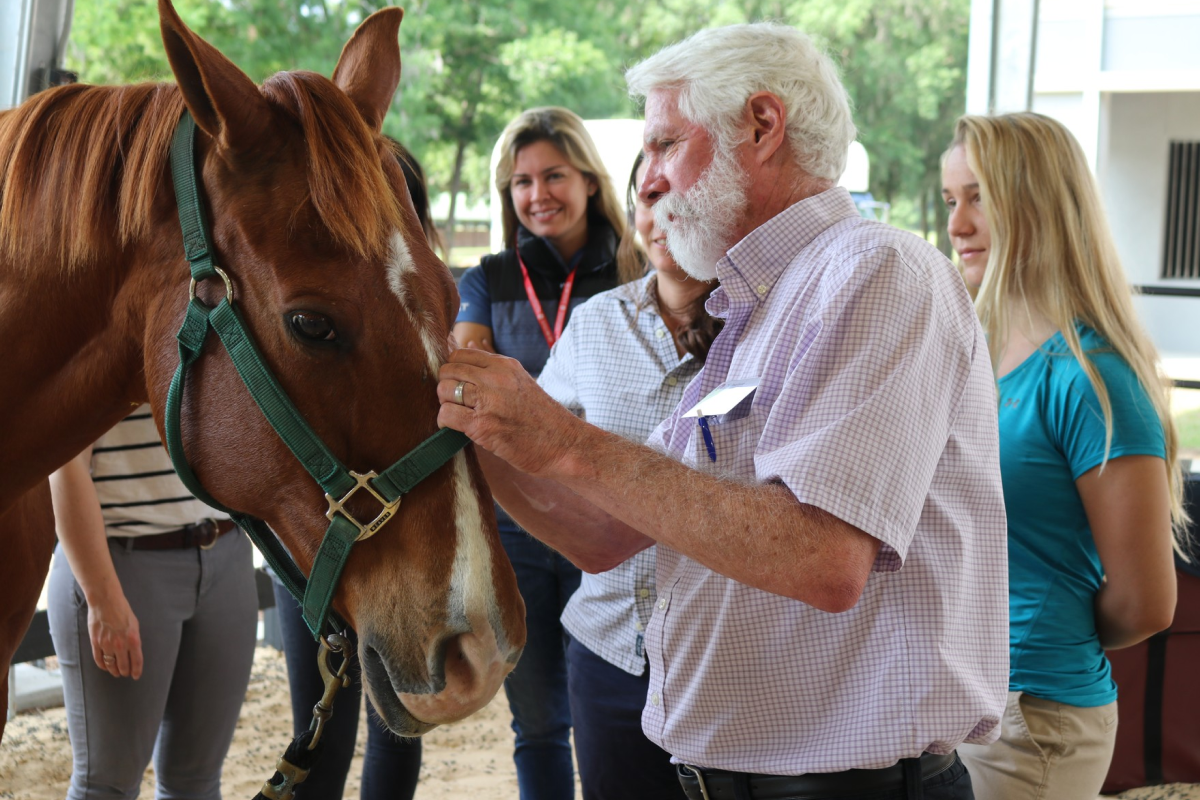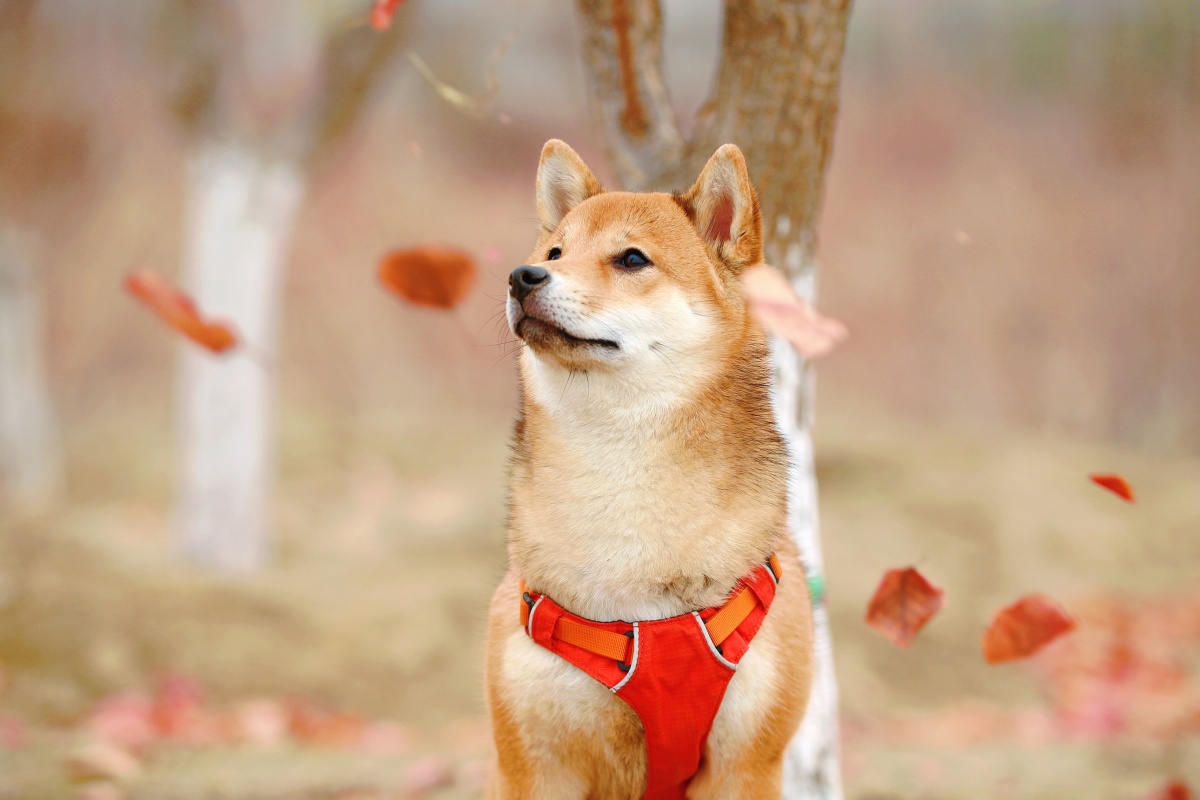
Program Overview
The Acupuncture Course Track is presented in 3 online and 2 on-site sessions.
During the online portions, you’ll overview the theories and frameworks needed for diagnosis and treatment of acupuncture patients. You then explore these frameworks more practically in recorded demos on live patients.
When you come to the Main Campus for the on-site portions, you’ll gather with classmates in live lectures on treating specific conditions, building on top of the online lectures. After an included catered lunch, you then split up into smaller lab groups allowing you to locate and discuss acupuncture points on live animals facilitated by instructors certified in acupuncture.

Major Topics
With a curriculum designed for students new to acupuncture, the Mixed Practice Acupuncture Program provides a comprehensive mix of both theory and practice. You will learn:
- Frameworks used in acupuncture: Five Elements, Yin-Yang, Eight Principles, Zang-Fu Physiology and Pathology, Meridians and Channels
- The scientific basis of acupuncture
- 122 canine and 177 equine acupuncture points on live animals
- Acupuncture techniques: electro-acupuncture, aqua-acupuncture, moxibustion, and dry needling
- TCVM diagnostic systems: patient personality, tongue and pulse diagnosis, and client inquiry
- How to integrate acupuncture into your practice

Additional Benefits
Once enrolled for the Acupuncture Certification Track at Chi, you will receive:
- Complimentary canine and equine acupoint chart
- Complimentary 32-hour Evidence-Based Veterinary Acupuncture Course
- 1-year complimentary membership with the World Association of TCVM (WATCVM)
- Free lifetime case consultation by Chi faculty
Program Features
Enjoy the convenience of online learning with 20 hours of virtual lab learning in 175 total hours of hybrid courses
Learn from Dr. Xie, the master of veterinary acupuncture
29 hours of intensive hands on learning with live animals in small lab groups capped at 6 students for every instructor
Start practicing acupuncture on patients after the first on-site session
Earn up to 25% of future master's degree credit per experiential learning
What our students have to say
I found this to be a very thorough and well organized introduction to TCVM. I appreciate learning the theory along with the evidence-based acupoint selection.
Cara Pillitteri, DVM
Boca Raton, FL
My expectations were beyond exceeded. All of the teachers and instructors were so nice and helpful. I could not be happier about my class experience!
Leah Sloan, DVM
Pullman, WA
The course really opened my eyes and reinforced the passion I have for this practice. I am already seeing ways to incorporate TCVM.
Adria Rodriguez, DVM
Grenada, West Indies
The whole program has been enlightening to me so far. I have been wanting to do this for 15 years. I am so glad I am finally here!
Kim Smith, DVM
Hampstead, NC
The labs were really well-run and well-thought-out with small groups. They ensured all points were covered and students had time to ask questions.
Nicole Estes
Conesus, NY
Veterinary Acupuncture Certification Track
Taught in English
For veterinarians & veterinary students only
150 RACE approved CE hours
Curriculum
Session 1
Course Introduction and History of Veterinary Acupuncture
1h
What is Acupuncture?
1h
Veterinary Acupuncture: Scientific Basis
2h
Yin-Yang
1h
Eight Principles
1h
Five Elements
2h
Zang-Fu Physiology
2h
Channels and Meridians
2h
General Rules of Acupuncture
4h
Indications for Veterinary Acupuncture
2h
How to Start your Acupuncture Practice: Cookbook (Equine)
1h
How to Integrate Acupuncture into your Practice (Equine)
1h
How to Start your Acupuncture Practice: Cookbook (Small Animal)
1h
How to Integrate Acupuncture into Your Practice (Small Animal)
1h
Anatomy for Acupuncturists
1h
Session 2
Five Elements and Zang-Fu Physiology
2h
Five-shu Transporting Points, Source Points, Back-shu and Front-mu points, Influential Points
2h
Mix Practice Point Lab
16h
How to Practice Acupuncture in Horses
1h
Equine Musculoskeletal Case Studies
1h
Other Special Points (Equine)
1h
TCVM Diagnosis Intro (Equine)
1h
Lameness Overview (Equine)
1h
Acupuncture for Lameness (Equine)
2h
Neurological Disorders (Equine)
1h
Other Special Points (Small Animal)
1h
TCVM Diagnosis Intro (Small Animal)
1h
How to Treat Bi/Wei Syndromes (Small Animal)
1h
Osteoarthritis and IVDD (Small Animal)
1h
How to Treat Gastro-Intestinal Disorders (Small Animal)
2h
How to Treat Respiratory Disorders (Small Animal)
2h
Session 3
Five Treasures: Qi, Blood, Shen, Jing, Body Fluid Physiology and Pathology
4h
TCVM Diagnosis
4h
Eight Extraordinary Channels
2h
Etiology and Pathology
2h
How to Select Acupoints
1h
How to Make a TCVM Diagnosis (Dry Lab)
2h
Acupuncture for Neurological Disorders
2h
How to Approach Clinical Cases
1h
How to Improve Acupuncture Results
2h
Small Animal Cases: TCVM Approach
3h
Equine Acupuncture Techniques
1h
Acupuncture for Equine Lameness
3h
Equine Special Conditions
2h
How to Approach Clinical Cases
1h
How to Improve Acupuncture Results
1h
Equine Cases: TCVM Approach
1h
Session 4
Review from Sessions 1-3
1h
How to Treat Renal Failure
1h
How to Treat Heart Failure
1h
How to Treat Behavioral Problems
1h
Introduction to Herbal Medicine (Small Animal)
2h
Introduction to Food Therapy (Small Animal)
1h
How to Treat Skin Problems (Small Animal)
1h
Acupuncture for Cancer (Small Animal)
1h
Feline Acupuncture
2h
Case Studies from Students (Small Animal)
1h
How to Treat GI Disorders (Equine)
1h
How to Treat Respiratory Problems (Equine)
1h
How to Treat Bi and Wei Syndrome (Equine)
1h
Acupuncture for Sports Medicine (Equine)
1h
How to Understand Herbal Medicine (Equine)
1h
How to Start Your Herbal Practice (Equine)
1h
How to Treat Cushing's Disease (Equine)
1h
How to Treat Other Endocrine Disorders (Equine)
1h
Acupuncture for Liver Diseases (Equine)
1h
Acupuncture for Skin Diseases (Equine)
1h
Dry Needling and Lab Demo
1h
Introduction to Electro-acupuncture
1h
Electro-acupuncture Demo
1h
Aqua-, Hemo-, and Pneumo-acupuncture
2h
Moxibustion
1h
Acupuncture Demo
4h
Case Demo
4h
Zang-fu Physiology
5h
Acupuncture Point Identification
20h
Virtual Internship
15h
Session 5
Overview Sessions 1-5
2h
How to Sell TCVM
1h
How to Treat Reproductive Disorders (Equine)
1h
Intro to Food Therapy (Equine)
1h
Intro to Tui-na (Equine)
1h
Acupuncture for Bovines, Caprines, and Camelids
1h
Final TCVM Overview
1h
Mixed Practice Point Lab
12h
How to Treat Diabetes and Cushing's Disease (Small Animal)
1h
How to Treat Thyroid Disorders (Small Animal)
1h
Intro to Food Therapy (Small Animal)
1h
Intro to Tui-na (Small Animal)
1h
Certification
CVA Certification
Students of the Veterinary Acupuncture program are eligible for the Certified Veterinary Acupuncturist certification endorsed by Chi University and the World Association of Traditional Chinese Veterinary Medicine (WATCVM). The CVA certification requirements are as follows:
Complete all sessions of the program
Pass three online quizzes with scores above 75%
Pass the written exam proctored online after the final session with a score over 75%
Pass the clinical acupoint exam in the final on-site session with a score above 75%
Submit one veterinary acupuncture case report to be approved
Complete 30 hours of advanced TCVM program training or internship with a certified veterinary acupuncturist
Please note that Chi cannot issue any certification to veterinary students until their DVM or equivalent has been obtained.
Textbooks
Instructors
Huisheng Xie
DVM, PhD
Dr. Xie has 41 years of clinical, teaching, and research experience in veterinary acupuncture and TCVM. He has trained over 10,000 veterinarians to practice TCVM worldwide. Dr. Xie’s education includes advanced training in veterinary medicine, veterinary acupuncture, and human acupuncture. Dr. Xie has authored 20 books and over 100 peer-reviewed papers. His textbooks, including Xie’s Veterinary Herbology, Xie’s Veterinary Acupuncture, and Traditional Chinese Veterinary Medicine-Fundamental Principles, have been used for TCVM training programs around the world. Dr. Xie continues to teach and develop educational courses and programs at Chi University, serves as a full clinical professor at the University of Florida’s College of Veterinary Medicine, and is an honorary professor at China Agricultural University, South China Agricultural University, and China Southwest University.
Read moreGreg Todd
DVM, CVA
Dr. Todd graduated from the University of Florida with a DVM in 1988. In 1993, Dr. Todd became an apprentice to Dr. Patrick Sullivan, AP, and began studying Traditional Chinese Medicine. In 1996, he became certified by IVAS. His studies continued at Chi. He has lectured and instructed nationally and internationally for IVAS, the North American Veterinary Conference, and Chi. Dr. Todd practices integrative veterinary medicine at the Animal Hospital of Dunedin in the Tampa Bay Area.
Cheryl Chrisman
DVM, MSTCVM, CVA, CVCH, CVTP, CVFT
Dr. Chrisman received her DVM from Michigan State University in 1968, an MS degree from the Ohio State University in 1974 and became certified in veterinary neurology by the American College of Veterinary Internal Medicine in 1976. Dr. Chrisman is a certified veterinary acupuncturist from Chi. She was a professor and Chief of the Neurology Service at UF for 30 years and integrated acupuncture into her neurology practice as well as a member of the UF Acupuncture Service. She is a Professor Emeritus at UF as well as the former Editor-in-Chief of the American Journal of Traditional Chinese Veterinary Medicine and is on the Executive Board of the American Association of Traditional Chinese Veterinary Medicine.
John Langlois
DVM, MSTCVM, CVA, CVMMP
Dr. Langlois is a graduate of the University of Florida College of Veterinary Medicine in 1981. He has been an equine practitioner in Marion County, Florida for the past 32 years, where he established his own practice in 1983 with an emphasis on reproductive medicine, lameness diagnostics, and surgery. He has received advanced training in veterinary acupuncture, Chinese veterinary herbal medicine, and veterinary Tui-na massage. He has been practicing for over 30 years and has been using Chinese medicine and spinal manipulation successfully for over 10 years enjoying treating at many of the prestigious thoroughbred farms in Marion County, FL.
Carla Pasteur
DVM, MSTCVM, CVA, CVTP, CVMMP, CVSMT, CERP
Dr. Pasteur grew up showing horses in many disciplines, including reining, saddleseat, dressage and pleasure. She graduated in 1991 from the University of Wisconsin and opened an equine exclusive clinic in Green Bay. The practice grew to cover five counties, with emphases on reproduction and lameness. She received her acupuncture training from IVAS in 1997, sold her conventional practice and began an equine alternative practice. She has been a Chi instructor since 2005 and has lectured internationally. Her current practice encompasses TCVM, veterinary medical manipulation and osteopathy, focusing on sport and performance horses.
Roger Clemmons
DVM, PhD, DACVIM (Neurology and Neurosurgery), CVA, CVFT
Dr. Clemmons graduated with his DVM from Washington State University. There, he also was granted a PhD in veterinary science (emphasis in neurophysiology and clinical neurology). Dr. Clemmons then took a faculty position at the University of Florida’s College of Veterinary Medicine where he practiced neurology and neurosurgery for 35 years before joining the private Veterinary Specialty Hospitals in Florida. Dr. Clemmons, a board-certified specialist in Neurology, has published over 100 peer-reviewed original studies, reviews, papers and abstracts and given numerous presentations, both in the US and abroad. At UF, he has had an active research program and is known for his work on platelet physiology and in the study of neurodegenerative diseases such as degenerative myelopathy. He has developed a number of innovative neurosurgical techniques including fixation of atlantoaxial subluxation and Wobbler’s syndrome. Dr. Clemmons taught veterinary and graduate students at the University of Florida for 35 years. Dr. Clemmons became a certified veterinary acupuncturist (CVA) at Chi in 2000. He was certified in TCVM Food therapy (CVFT) from Chi in 2009. He integrates Veterinary Acupuncture, Herbal Medicine, and nutrition into his practice. He is a national and international speaker in the field of neurology and the science of veterinary acupuncture.
Allison Faber Marshall
DVM, MS, CVA, CVSMT
Dr. Allison Faber Marshall graduated from University of Florida College of Veterinary Medicine in 1995 and moved to Virginia into general equine practice. She opened Full Circle Veterinary Services, PC in 2005 after becoming a Certified Veterinary Spinal Manipulation Therapy (CVSMT) through Healing Oasis Wellness Center and a Certified Veterinary Acupuncturist (CVA) through Chi University where she also trained in veterinary herbal medicine, food therapy, and tui-na, culminating in completion of a Master’s of Science in Traditional Chinese Veterinary Medicine. Dr. Marshall served on the AAEP ethics committee from 2010-2013. She has been an instructor at Chi since 2010. Her busy practice is limited to equine alternative therapies in Virginia and Maryland, and she enjoys a large variety of sport horses and beloved friend as patients. She has 3 grown children, and is an avid surfer, knitter, yarn spinner, gardener, and works to keep her many interests and profession in balance.
Terri Rosado
DVM, CVA, CTCVMP, CCRT, CVMMP
Dr. Terri Rosado holds certifications in all Traditional Chinese Veterinary Medicine branches. As an Assistant Professor at Chi University and the medical director of Chi Animal Hospital, Dr. Rosado is passionate about education, offering externships to Chi and veterinary school students, and inviting volunteers to experience small animal veterinary practice.
Enrollment Options
Semester
Spring 2024
Schedule & Tuition
Session 1 includes the $100 application fee.
Session 1
Online
Jan 1 - Jan 31, 2024
$1,220.00
Session 2
On-site in Reddick, FL
Feb 1 - Feb 4, 2024
$1,800.00
Thursday, February 1, 2024 | |
7:45 AM | Check-in begins |
Sunday, February 4, 2024 | |
1:00 PM | Class Ends |
Session 3
Online
Feb 5 - Apr 7, 2024
$1,120.00
Session 4
Online
Mar 1 - Jun 5, 2024
$1,800.00
Session 5
On-site Portion in Reddick, FL
Jun 6 - Jun 8, 2024
Online Portion - Proctored Written Exam
Jun 11 - Jun 12, 2024
$1,540.00
Thursday, June 6, 2024 | |
7:45 AM | Check-in begins |
Saturday, June 8, 2024 | |
5:30 PM | Class ends |
Payment Information
A $250.00 non-refundable course deposit is charged upon enrollment to reserve your seat.
Payment is due 60 days before the start date of each session or course.
Add-ons
CVA Certification
$350.00
Printed Binders
$50.00 / on-site
Required Textbooks
$340.00
Frequently Asked Questions
Do I have to take acupuncture classes in a prescribed order or can I start at any time?
You must start at session one and continue along in order. If you have mitigating circumstances, you will have to defer all following sessions until the next semester.